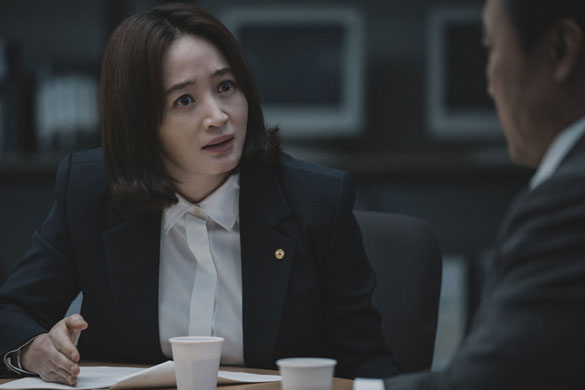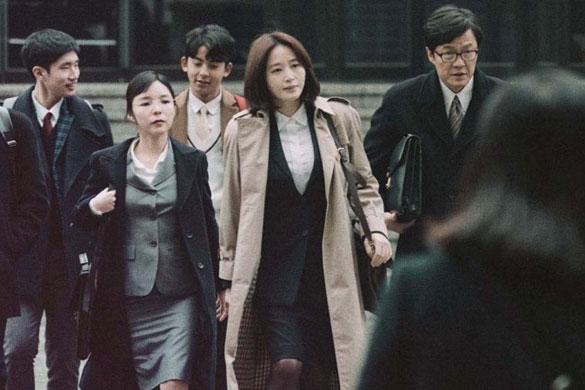"Am I the only one who finds this hilarious? I didn't realise it but you're an emotional person, Ms. Han...
This is why there are no women in high government positions. They can't be rational at critical moments.
Women are ruled by their emotions. It was wrong to even bring a woman on board..."
Synopsis:
With East Asia in the grip of an ever-growing financial crisis, foreign investors start pulling out of Korea, fearing the country is at risk of imminent bankruptcy. Realising that this worrying trend could easily become a self-fulfilling prophecy, Han Si-hyun (Kim Hye-soo) – a financial analyst at Bank of Korea – reports her fears to her boss and together they take on the task of informing relevant financial parties and politicians, offering their expertise to help find a solution that will bring the Korean economy back from the brink of ruin.
However, while Si-hyun has the future of large and small companies, and indeed the welfare of every single struggling Korean worker, at the forefront of her mind, the Deputy Minister for Finance seems increasingly determined to call in the IMF to negotiate a bailout in spite of its likely demand for catastrophic layoffs and the risk of numerous family businesses failing...
Review:
With its narrative centred on the real life economic near-implosion Korea faced in the late 90s in the midst of the financial crisis engulfing East Asia in its entirety, Default naturally sits alongside the many other stories based in fact that have peppered Korean cinema over years, whether absolute classics from the very cusp of the New Korean Cinema wave such as Park Kwang-su’s discussion of labour laws in A Single Spark (1995) or more recent commercial successes including the Gwangju based Taxi Driver (2017) or indeed 1987: When the Day Comes (also 2017) not least discussing Gwangju's aftermath, to name but a few.
However, a basis in fact is not all that links such films together, for Korean directors have a frankly exemplary record of imbuing tales of these types with a palpable emotional resonance by focusing on how specific individuals – sometimes historically real, sometimes fictional – are affected by national issues, allowing character empathy to bring greater viewer understanding of often complex, specifically Korean situations and country changing events. That’s certainly the case in Default but, in splitting the narrative between Si-hyun’s (essentially, our heroine) increasingly desperate efforts to find a solution that will serve Korea and its people best; her battle with the Deputy Minister for Finance and the lead IMF negotiator (the villains of the piece, if you will); ex-fund manager Jung-hyuk’s (Yoo Ah-in) determination to use his financial knowledge to make himself a fortune from the crisis; and the disintegration of the lives of two family men struggling to keep their small business afloat, director Choi Kook-hee deftly gives life (literally) to the story overall in a wholly personal manner.
That could obviously be said to be vital to any historical, factual story but it is especially important here where we’re dealing with so many monetary facts, figures and complex downward financial trends.
 |
My apologies to anyone working in and/or excited by the financial sector who sits gripped by the Money Matters section of the news but to my mind finance can, almost by its very nature, be dry and far more national than personal even though one affects and drives the other.
Thankfully, by relating each step of Korea’s financial downward spiral to both those charged with fixing the situation and the helpless workers watching their lives and livelihoods disintegrate as a direct result, Default wholly succeeds in being absolutely gripping throughout. This is helped further by references to societal issues at the time and indeed since, be it the increasing rate of suicides among those finding themselves in financial dire straits or indeed male attitudes towards women in this historically patriarchal country.
The Deputy Minister for Finance in particular is shown to be an absolute misogynist, at one point ranting that women such as Si-hyun shouldn’t be allowed to have jobs or positions of any importance because they are unable to make decisions logically as a result of their heads being ruled by emotion, and claiming he initially thought the women present at financial negotiations were no more than secretaries.
 |
Not only does focusing on the story from Si-hyun’s perspective allow this by its very nature but her clear intelligence, confidence and will repeatedly point to female strength in the face of male prejudice – a trend that has been so important to Korean cinema as a whole over the past few years – and while these references are pretty much stated rather than discussed they nonetheless combine with the financially-based story to give a decent snapshot of things that, in hindsight, Korea really needed to address to ultimately move forward on the world stage.
As far as the financial story itself is concerned, it could be said it has been simplified somewhat but I don’t necessarily see that as a bad thing. Rather, it ensures Default is never bogged down with what are in reality hugely complex and involved money matters and pretty much guarantees that even those with little knowledge of economics and national finance will be able to understand proceedings without having to suspend their focus on the strong human aspects of the tale to get the gist.
Ultimately, Default is a well crafted film telling an historically important story but its true success comes from the humanity (or lack thereof) deftly detailed within it.
Summary:
Based on Korea’s economic near-implosion in the late 90s during the East Asian financial crisis, Default deftly uses specific character perspectives to make what is in essence a tale of national finance feel wholly personal and utterly gripping in a human sense as well as historically interesting, as a result.
DEFAULT (국가부도의날) / 2018
Director: Choi Kook-hee
Starring: Kim Hye-soo, Yoo Ah-in, Jo Woo-jin, Vincent Cassel
|





